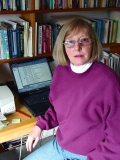Professor Isebill “Ronnie” Gruhn arrived at UC Santa Cruz in 1969 as a member of the politics department and an affiliate of Stevenson College. Before coming to UC Santa Cruz she had been teaching at Oberlin College.
Born in Leipzig, Germany, Gruhn is the daughter of a partially Jewish (mixed heritage and religion) mother; her non-Jewish father joined the resistance and helped Jews escape from Germany. He spent much of World War II imprisoned in Nazi labor camps. Gruhn’s early life was one of upheaval and dislocation; a background uncannily congruent with the interviewer’s own family heritage.
Gruhn immigrated to New York City with her parents when she was nearly twelve years old. Her experiences during the war led to an interest in “knowing how the world worked.” She attended Dickinson College for her BA in politics; earned her MA in international studies from Johns Hopkins University, and her PhD in political science from UC Berkeley. Gruhn became an expert and widely published scholar in international politics and international law, who has focused on Africa, international and transnational institutions, and relations between rich and poor states.
One of very few tenured women during UCSC’s early days and one of the first to serve as a high-level administrator, Gruhn was the first female dean of social sciences (1981-1983) and the first female academic vice chancellor (acting) from 1987-1989. This was during the period when UCSC was, as Gruhn calls it, “an essentially male institution.” She never affiliated with UCSC’s women’s studies (feminist studies) department, yet she consciously chose positions of leadership at UCSC because she wanted to show that women could excel in administration.
Gruhn served in diverse capacities at UC Santa Cruz over the past four decades. She twice chaired the politics department (1973-1975 and 1980-1981) and was an active member of Stevenson College, including founding and teaching in Stevenson’s prestigious and interdisciplinary Modern Society and Social Thought major. In the 1990s (1994-1998), Gruhn directed the UCDC Program for UC Santa Cruz, a program that supervises and supports students who pursue internships and academic study in the nation’s capital. Most recently, she chaired the Academic Senate Committee on Emeriti Relations and has continued to teach courses for the politics department and lecture for the UCSC Lifelong Learners Program. These varieties of experience on and off campus provided her with a wide-angle lens through which to observe and consider UCSC’s trajectory from its early years as an innovative experiment in public higher education to its more recent configuration as a somewhat more conventional research university. Gruhn’s opinions on the political, cultural, and structural changes at UC Santa Cruz over more than four decades are sometimes salty but it is clear that she is critical because she cares deeply about the Santa Cruz campus as a dynamic institution.
This oral history was conducted in McHenry Library on the UC Santa Cruz campus in October of 2013, in two sessions of approximately two hours each. It is part of a series of oral history interviews the Regional Oral History Office is conducting with early UCSC women faculty.


 Santa Cruz, CA
Santa Cruz, CA



